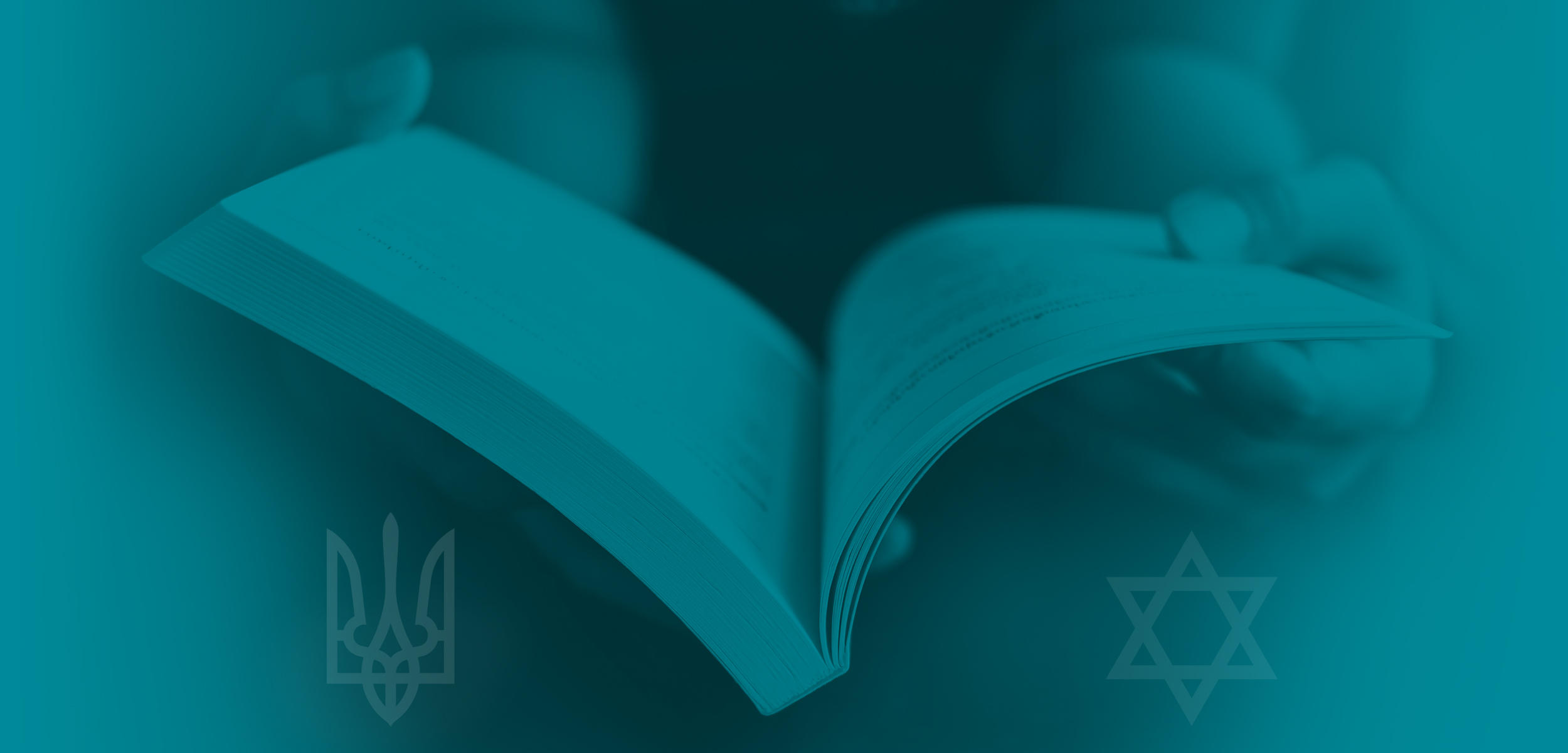Read About our Stories — Publications
The Ukrainian Jewish Encounter was founded in 2008 with the goal of building stronger relations between Ukrainians and Jews, two peoples who for centuries lived side by side on the territory of what is modern-day Ukraine. Since then, in keeping with its motto “Our stories are incomplete without each other,” UJE has sponsored conferences, round-table discussions and research, as well as translations and publication of works the organization anticipates will promote a deeper understanding between the two peoples and an appreciation of their respective cultures.
Some of the works highlighted in this section are a direct outgrowth of UJE-supported events, while others are translations of works that had already appeared in the English-language. Several publications benefited from a grant provided by the Government of Canada. In all instances, the views expressed in these publications are those of the authors and editors and do not necessarily reflect the views of UJE.
Jews and Ukrainians: A Millennium of Co-Existence
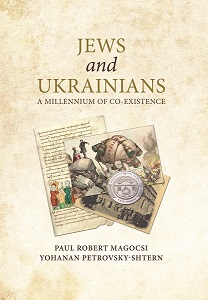 The Ukrainian Jewish Encounter, with the support of the Government of Canada, sponsored the publication of Jews and Ukrainians: A Millennium of Co-Existence.
The Ukrainian Jewish Encounter, with the support of the Government of Canada, sponsored the publication of Jews and Ukrainians: A Millennium of Co-Existence.
There is much that ordinary Ukrainians do not know about Jews and that ordinary Jews do not know about Ukrainians. As a result, those Jews and Ukrainians who may care about their respective ancestral heritages usually view each other through distorted stereotypes, misperceptions, and biases. This book sheds new light on highly controversial moments of Ukrainian-Jewish relations and argues that the historical experience in Ukraine not only divided ethnic Ukrainians and Jews but also brought them together.
The story of Jews and Ukrainians: A Millennium of Co-Existence is presented in twelve thematic chapters. Among the themes discussed are geography, history, economic life, traditional culture, religion, language and publications, literature and theater, architecture and art, music, the diaspora, and contemporary Ukraine. The book’s easy-to-read narrative is enhanced by 335 full-color illustrations, 29 maps, and several text inserts that explain specific phenomena or address controversial issues.
Jews and Ukrainians: A Millennium of Co-Existence provides a wealth of information for anyone interested in learning more about the fascinating land of Ukraine and two of its most historically significant peoples. The book was co-authored by Paul Robert Magocsi, Chair of Ukrainian Studies at the University of Toronto, and Yohanan Petrovsky-Shtern, Professor of Jewish history and culture at Northwestern University.
The book can be ordered from the links below.
Babyn Yar: History and Memory
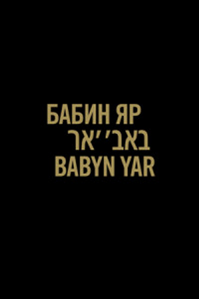 A ravine on the outskirts of Kyiv on September 29-30, 1941 was witness to one of the great atrocities of the Holocaust. There, over a two-day period, nearly 34,000 Kyiv Jews were shot to death in one of the first major events that has become known as the “Holocaust by Bullets”.
A ravine on the outskirts of Kyiv on September 29-30, 1941 was witness to one of the great atrocities of the Holocaust. There, over a two-day period, nearly 34,000 Kyiv Jews were shot to death in one of the first major events that has become known as the “Holocaust by Bullets”.
With deep compassion and understanding, a group of internationally-renowned scholars discuss the treatment of Babyn Yar in culture, music, and the arts from Stalinist times to our own. Beyond the detailed and harrowing accounts of what took place in Kyiv in late September 1941, the essays in this volume realize the importance of preserving Babyn Yar as a symbol of the Holocaust and other tragedies of the twentieth century.
The book was published in conjunction with a series of events sponsored by UJE to commemorate the 75th anniversary of Babyn Yar.
Babyn Yar: History and Memory was edited by Paul Robert Magocsi, Chair of Ukrainian Studies at the University of Toronto and Vladislav Hrynevych, Leading Scholar at the Kuras Institute for Political and Ethnic Studies, Ukraine
The Ukrainian-Jewish Encounter: Cultural Dimensions
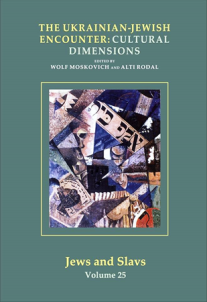 The Ukrainian-Jewish Encounter: Cultural Dimensions is a collection of essays that examine the interaction between the Ukrainian and Jewish cultures from the seventeenth century onwards. Written by leading experts from Ukraine, Israel, and other countries, the book presents a broad perspective on parallels and cross-cultural influences in various domains—including the visual arts, folklore, music, literature, and language. Several essays also focus on mutual representation—for example, perceptions of the "Other" as expressed in literary works or art history.
The Ukrainian-Jewish Encounter: Cultural Dimensions is a collection of essays that examine the interaction between the Ukrainian and Jewish cultures from the seventeenth century onwards. Written by leading experts from Ukraine, Israel, and other countries, the book presents a broad perspective on parallels and cross-cultural influences in various domains—including the visual arts, folklore, music, literature, and language. Several essays also focus on mutual representation—for example, perceptions of the "Other" as expressed in literary works or art history.
The richly illustrated volume contains a wealth of new information on these little-explored topics. The book appears as volume 25 in the series Jews and Slavs published by the Hebrew University of Jerusalem since 1993. In several previous volumes considerable attention is given to the defining role of the Old Testament in Ukrainian literature and art and to the depiction of Jewish life in Ukraine in the works of Nikolai Gogol, Taras Shevchenko, Ivan Franko, Lesia Ukrainka, Vladimir Korolenko, and other writers.
This collection of essays was co-edited by Wolf Moskovich, Professor Emeritus, Hebrew University of Jerusalem; and Alti Rodal, Co-Director of the Ukrainian Jewish Encounter, who also wrote the introduction to the volume.
Published in 2016 by Hebrew University of Jerusalem. The book can be acquired by contacting Wolf Moskovich at [email protected].
The PDF version of the book is available here.
The Jews of Lemberg: A Journey to Empty Places
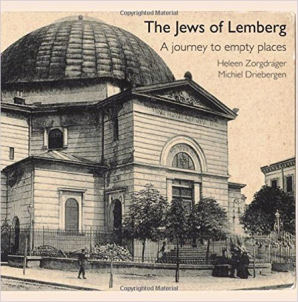 Throughout the different periods of its sometimes-tumultuous history, Lviv, Ukraine’s cultural capital, was also known as Leopolis, Lemberg, and Lwow. Yet no matter the city’s name, Jews made major contributions to its culture, economy, and social life. Indeed, at one time, this multi-ethnic city, a bright jewel in the Austro-Hungarian Empire, boasted 45 synagogues and houses of worship. Then came the Second World War and the majority of the city’s Jews perished in the Holocaust and their cultural and religious institutions were destroyed.
Throughout the different periods of its sometimes-tumultuous history, Lviv, Ukraine’s cultural capital, was also known as Leopolis, Lemberg, and Lwow. Yet no matter the city’s name, Jews made major contributions to its culture, economy, and social life. Indeed, at one time, this multi-ethnic city, a bright jewel in the Austro-Hungarian Empire, boasted 45 synagogues and houses of worship. Then came the Second World War and the majority of the city’s Jews perished in the Holocaust and their cultural and religious institutions were destroyed.
This short, yet powerful, book, attempts to return Lviv’s lost Jewish heritage through the stories of three Jewish survivors, whose lives are interwoven with the city’s tragic past. The book is accompanied by photographs and maps as well as reference materials.
Heleen Zorgdrager teaches systematic theology and gender studies, as well as mission studies at the Protestant Theological University (Amsterdam) and is associate professor of the Institute of Ecumenical Studies, Ukrainian Catholic University in Lviv, Ukraine. Michiel Driebergen is a writer and journalist specializing in Central and Eastern European affairs.
Living a Miracle: Truda Rosenberg's Story
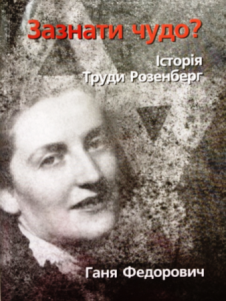 When she was teaching at Saint Paul University in Ottawa, the Canadian writer Hania Fedorowitz heard a lecture given by Holocaust survivor Truda Rosenberg, a child of Lviv. Struck that the gentle woman was born in the same year as her own mother, Fedorowitz approached Rosenberg and thus starting a six-year literary friendship, begun in 2005, that would result in the publication of a Polish-language book called Doznac Cudu.
When she was teaching at Saint Paul University in Ottawa, the Canadian writer Hania Fedorowitz heard a lecture given by Holocaust survivor Truda Rosenberg, a child of Lviv. Struck that the gentle woman was born in the same year as her own mother, Fedorowitz approached Rosenberg and thus starting a six-year literary friendship, begun in 2005, that would result in the publication of a Polish-language book called Doznac Cudu.
This is a touching dialogue between two women, who, although separated by distance and age, make real in their conversations the power of love over hate, resilience over despair, and confirm the knowledge that no matter how much we may try, the past in closer to us than we think.
The Ukrainian-language version of the book was unveiled in 2016. The volume also includes an afterward “To See God Even in the Abyss of Hell” penned by the Ukrainian human rights activist and Soviet political prisoner Myroslav Marynovych.
The book was translated by the award-winning Andrij Pavlyshyn, and was made possible through UJE and Mykhailo Sherman, who took an active role in the rebirth of Jewish life in Lviv and suddenly passed away in 2015
“Shaking the Dust Off”: The Story of the Warsaw Ghetto’s Forgotten Chronicler, Ruben Feldschu (Ben Shem)
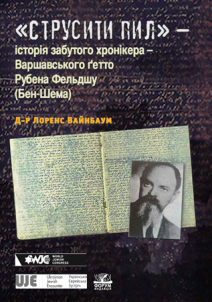 Ruben Feldschu (Ben Shem) (1900-1980) was one of the best known and most prolific figures of the Zionist Right in interwar Poland. A proficient Hebraist, he kept a detailed journal of events in German-occupied Warsaw. That diary is a meticulous and excruciating chronicle of daily life and death and a poignant work of literature. Miraculously, Feldschu managed to preserve more than eight hundred pages of notes throughout his escape from the ghetto, more than a year in hiding, and during a difficult journey to the Land of Israel. Only fragments of this invaluable contemporaneous material have been deciphered and published. Although Feldschu’s writings represent the supreme effort of an accomplished author with the broadest intellectual horizons, they inexplicably never found a place in the mainstream historiography of the Holocaust.
Ruben Feldschu (Ben Shem) (1900-1980) was one of the best known and most prolific figures of the Zionist Right in interwar Poland. A proficient Hebraist, he kept a detailed journal of events in German-occupied Warsaw. That diary is a meticulous and excruciating chronicle of daily life and death and a poignant work of literature. Miraculously, Feldschu managed to preserve more than eight hundred pages of notes throughout his escape from the ghetto, more than a year in hiding, and during a difficult journey to the Land of Israel. Only fragments of this invaluable contemporaneous material have been deciphered and published. Although Feldschu’s writings represent the supreme effort of an accomplished author with the broadest intellectual horizons, they inexplicably never found a place in the mainstream historiography of the Holocaust.
Laurence Weinbaum, Director of the Israel Council on Foreign Relations, wrote the English-language article. It originally appeared in the Jewish Political Studies Review and is available here.
The Ukrainian-language article (PDF) is available here.
Stories of Khmelnytsky: Competing Literary Legacies of the 1648 Ukrainian Cossack Uprising
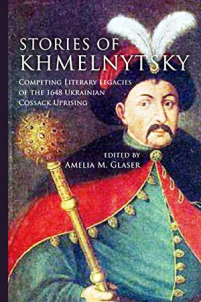 Stories of Khmelnytsky: Competing Literary Legacies of the 1648 Ukrainian Cossack Uprising, edited by Amelia M. Glaser, is a collection of fascinating essays by distinguished scholars on the very much contested image of the charismatic yet polarizing figure Hetman Bohdan Khmelnytsky. Valorized or vilified, Khmelnytsky is a crucial personality in the various competing mythologies that have shaped the politics of history and memory in Eastern Europe. The conflicting meanings and interpretations of Khmelnytsky continue to affect interethnic and political relations to the present day. This volume provides an invaluable framework to understanding the historical development of the various narratives that have influenced Ukrainian, Jewish, Polish, and Russian national identity.
Stories of Khmelnytsky: Competing Literary Legacies of the 1648 Ukrainian Cossack Uprising, edited by Amelia M. Glaser, is a collection of fascinating essays by distinguished scholars on the very much contested image of the charismatic yet polarizing figure Hetman Bohdan Khmelnytsky. Valorized or vilified, Khmelnytsky is a crucial personality in the various competing mythologies that have shaped the politics of history and memory in Eastern Europe. The conflicting meanings and interpretations of Khmelnytsky continue to affect interethnic and political relations to the present day. This volume provides an invaluable framework to understanding the historical development of the various narratives that have influenced Ukrainian, Jewish, Polish, and Russian national identity.
Amelia M. Glaser is Associate Professor of Russian and Comparative Literature at the University of California, San Diego.
Stories of Khmelnytsky was published in 2015 as part of the Stanford Studies on Central and Eastern Europe series and can be ordered from Stanford University Press or from amazon.com.
Currently the book is available only in English.
The Shoah in Ukraine: History, Testimony, Memorialization
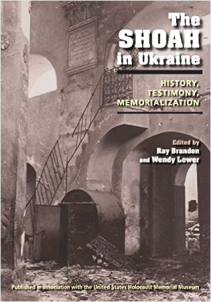 On the eve of the Nazi invasion of the USSR in 1941, Ukraine was home to the largest Jewish community in Europe. Between 1941 and 1944, some 1.4 million Jews were killed there, and one of the most important centers of Jewish life was destroyed. Yet, little is known about this chapter of Holocaust history. Drawing on archival sources from the former Soviet Union and bringing together researchers from Ukraine, Germany, Great Britain, the Netherlands, and the United States, The Shoah in Ukraine sheds light on the critical themes of perpetration, collaboration, Jewish-Ukrainian relations, testimony, rescue, and Holocaust remembrance in Ukraine.
On the eve of the Nazi invasion of the USSR in 1941, Ukraine was home to the largest Jewish community in Europe. Between 1941 and 1944, some 1.4 million Jews were killed there, and one of the most important centers of Jewish life was destroyed. Yet, little is known about this chapter of Holocaust history. Drawing on archival sources from the former Soviet Union and bringing together researchers from Ukraine, Germany, Great Britain, the Netherlands, and the United States, The Shoah in Ukraine sheds light on the critical themes of perpetration, collaboration, Jewish-Ukrainian relations, testimony, rescue, and Holocaust remembrance in Ukraine.
Contributors include Andrej Angrick, Omer Bartov, Karel C. Berkhoff, Ray Brandon, Martin Dean, Dennis Deletant, Frank Golczewski, Alexander Kruglov, Wendy Lower, Dieter Pohl, and Timothy Snyder.
Archbishop Andrei Sheptytsky and the Ukrainian Jewish Bond
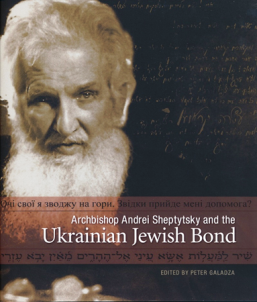 In November 1942, the head of the Ukrainian Greek Catholic Church, Metropolitan Andrei Sheptytsky, wrote an impassioned pastoral letter to his faithful titled “Though Shalt Not Kill” urging them not to participate in Nazi atrocities. It was an act of courage; history showed the Metropolitan was the only European Church leader during the war to publically denounce the killing of Jews during the Holocaust.
In November 1942, the head of the Ukrainian Greek Catholic Church, Metropolitan Andrei Sheptytsky, wrote an impassioned pastoral letter to his faithful titled “Though Shalt Not Kill” urging them not to participate in Nazi atrocities. It was an act of courage; history showed the Metropolitan was the only European Church leader during the war to publically denounce the killing of Jews during the Holocaust.
In April 2012, a group of Ukrainian religious leaders traveled to North America to attend a ceremony in Ottawa in which Canadian parliamentarians honored the Metropolitan’s actions during the Second World War. Along with his letter, these acts included harboring Jews in his residence in Lviv and ordering priests and nuns to hide Jewish children in orphanages belonging to the Church. Because of the Metropolitan’s actions, over 150 Jews were saved from certain death in the Holocaust.
This commemorative volume recounts the life of Metropolitan Sheptytsky as well as his special relationship with the Jewish community in the Western Ukrainian region known as Halychyna (Galicia), and shares the thoughts of Jews who were saved because of the Metropolitan’s actions.
Peter Galadza, a Ukrainian Greek Catholic priest, is Kule Family Professor of Liturgy at the Sheptytsky Institute of Eastern Christian Studies in the Faculty of Theology, Saint Paul University, Ottawa, Canada. He is also a member of the Faculty of Graduate and Post-Doctoral Studies at the University of Ottawa.
A PDF (English) version of the book is available here.
Yiddish-Ukrainian Dictionary
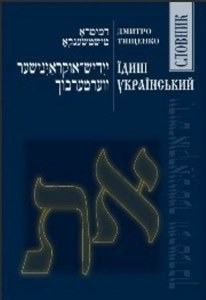 Yiddish was for centuries the spoken language of Jews in Ukraine. Then came the destruction of Europe’s Jews, and the loss of a language that defined their essence.
Yiddish was for centuries the spoken language of Jews in Ukraine. Then came the destruction of Europe’s Jews, and the loss of a language that defined their essence.
Philologist Dmytro Tyshchenko spent over a decade compiling this 945-page tome, the world’s largest bilingual Yiddish dictionary. The dictionary contains some 30,000 words and expressions and is an attempt to fill a gap that exists in the national lexicography.
In the words of Tyshchenko, the dictionary “makes it possible to draw the attention of the wider cultural community to the fact that there is continued interest in the Yiddish language in the country where it had existed for centuries as the language of the majority of the Jewish population, and where it was tied to great literary achievements.”
Tyshchenko is a Germanist, a philologist, and editor of the only Hebrew-language magazine in Ukraine.
Published in 2014, the dictionary can be ordered from the publisher Art Ekonomy.
Jewish Documentary Sources in the Regional Archives of Ukraine: A Guide (Nikolaev, Odessa, Kherson Regions)
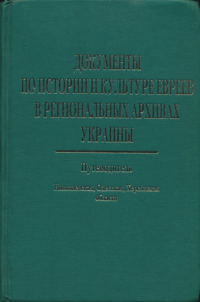 Researchers interested in the history of Jews in the Mykolayiv, Odessa, and Kherson oblasts will find this volume a useful resource in investigating Jewish life in southern Ukraine. The volume is part of the archival project at "Project Judaica", a joint academic program on Jewish Studies at the National University Kyiv-Mohyla Academy and the Russian State University for the Humanities in Moscow, which is sponsored by The Jewish Theological Seminary. For more information contact www.jtsa.edu.
Researchers interested in the history of Jews in the Mykolayiv, Odessa, and Kherson oblasts will find this volume a useful resource in investigating Jewish life in southern Ukraine. The volume is part of the archival project at "Project Judaica", a joint academic program on Jewish Studies at the National University Kyiv-Mohyla Academy and the Russian State University for the Humanities in Moscow, which is sponsored by The Jewish Theological Seminary. For more information contact www.jtsa.edu.
Ukrainian-Jewish Relations in Historical Perspective
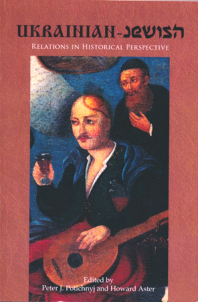 Ukrainian-Jewish Relations in Historical Perspective (Third Edition), edited by Howard Aster and Peter J. Potichnyj, is based on a groundbreaking conference held at McMaster University in Hamilton, Canada in 1983. The historic gathering featured distinguished scholars from North America and Israel who addressed the complex and often controversial history of relations between Jews and Ukrainians. The historical period covered ranges from the seventh to the twentieth century. There has been a rapid expansion of research on Ukrainian-Jewish relations in the last couple of decades and this publication reflects this development with the addition of a select bibliography of books that has been added to this third edition. The essays in this book nonetheless still often provide the most definitive discussions of their respective topics.
Ukrainian-Jewish Relations in Historical Perspective (Third Edition), edited by Howard Aster and Peter J. Potichnyj, is based on a groundbreaking conference held at McMaster University in Hamilton, Canada in 1983. The historic gathering featured distinguished scholars from North America and Israel who addressed the complex and often controversial history of relations between Jews and Ukrainians. The historical period covered ranges from the seventh to the twentieth century. There has been a rapid expansion of research on Ukrainian-Jewish relations in the last couple of decades and this publication reflects this development with the addition of a select bibliography of books that has been added to this third edition. The essays in this book nonetheless still often provide the most definitive discussions of their respective topics.
Howard Aster taught political science at McGill University, Carleton University, and McMaster University, and has served on the Board of Directors of the CBC and at Haifa University. Peter J. Potichnyj taught political science at Uppsala College, Sir Wilfrid Laurier University, the Ukrainian Free University, and McMaster University, and served as president of the Canadian Association of Slavists.
The third edition can be ordered from the Canadian Institute of Ukrainian Studies Press. Earlier editions can be found on Amazon.







